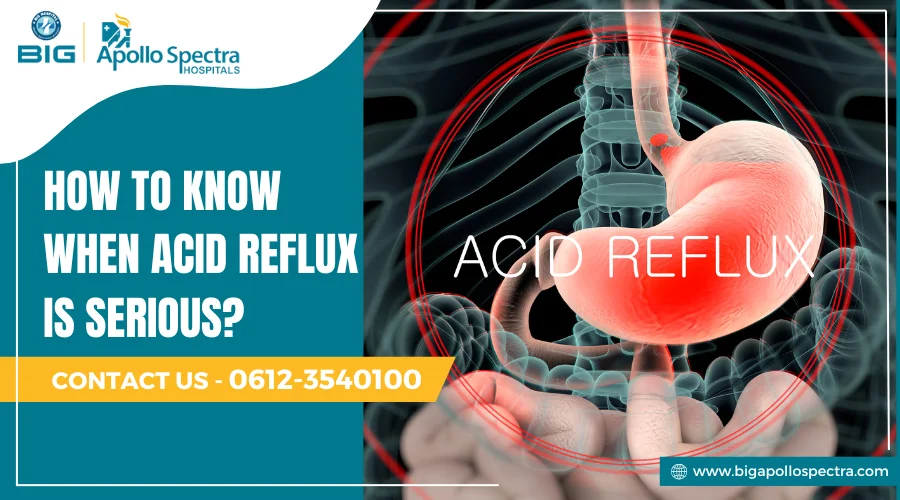Acid reflux usually happens when stomach acid flows back into the esophagus, which produces an intense burning feeling in the chest. This sensation often gets more severe when you lie down, and you might also find yourself unable to rest.
Well, heartburn after eating spicy foods happens frequently, and it usually isn’t a cause for concern if this happens occasionally. However, ongoing or intense symptoms might indicate Gastroesophageal Reflux Disease (GERD) or acid reflux.
For this reason, many people wonder, “is acid reflux dangerous?” The seriousness and duration for which your symptoms last both determine whether acid reflux poses a serious threat or not.
In any case, it’s essential to recognize when acid reflux might turn from a minor discomfort into a severe medical issue. This is crucial to avoid long-term complications and receive proper treatment on time.
This guide by Big Apollo Spectra sheds some light on how to recognize acid reflux symptoms that require medical intervention and also explains the dangers of neglecting severe signs if there are any.
Recognizing Symptoms of Serious Acid Reflux

Nowadays, it’s common to experience acid reflux once in a while, but some occurrences might signal a serious illness that requires medical help.
The following warning signs tend to appear more often or with higher intensity and will most often continue to exist even after trying home treatments. Early identification of these warning signs can protect your digestive system from permanent harm and also enhance your quality of life.
1. Persistent Or Worsening Heartburn
Heartburn episodes that happen multiple times per week or more than twice weekly signal a potential serious health issue. Also, if the heartburn continues in spite of using over-the-counter treatments, you may have to seek a doctor’s advice to get relief.
When you find yourself repeatedly unsure of what to do during an acid reflux attack and remedies fail to help, you need to see a gastroenterologist.
Moreover, if you experience repeated nighttime heartburn, it can cause more harm because the horizontal position during sleep reduces the swallowing action. Monitoring patterns in your symptoms can help reveal the causes in your particular case.
Heartburn after meals usually points to food-related triggers while symptoms that are not related to eating can signify serious conditions. Repeated symptoms even after taking antacids that return within hours may show significant reflux, needing prescription medication or further examination by a doctor.
2. Difficulty Swallowing (Dysphagia)
The feeling of food getting stuck in your throat or chest might signal esophageal narrowing caused by acid damage. In this case, it’s important that you seek immediate assessment from the best gastroenterology doctor in Patna because this symptom might indicate severe esophageal damage or other critical health issues.
You must remember that the development of swallowing difficulties that progress from solids to liquids can indicate progressive narrowing within the esophagus.
Patients who feel the need to drink liquids to swallow down food because their food gets stuck or who experience painful swallowing sensations (known as odynophagia) can have esophageal inflammation or ulceration.
Patients experiencing swallowing difficulties along with unexpected weight loss need immediate medical attention to eliminate the possibility of serious issues.
3. Chronic Cough or Hoarseness
The flowing back of stomach acid into your throat and voice box will result in throat irritation which can cause chronic cough, throat clearing, and changes in voice.
Symptoms which persist for weeks instead of occasional throat discomfort suggest regular acid damage to the throat and respiratory structures. If you’ve been experiencing these persistent symptoms, please don’t delay medical consultation anymore.
If you notice that some hoarseness in your voice is present in the morning and it gets better as the day progresses, it typically indicates nighttime reflux. This means that the acid has moved up the esophagus while you were sleeping.
However, also remember that if you experience a continuous sensation of something in your throat that drinking water does not alleviate, it might be due to long-term irritation caused by acid exposure.
If your voice quality is declining and impacting work or personal conversations, you should seek medical assessment particularly when you’ve no respiratory infections or allergies.
4. Regurgitation of Food Or Sour Liquid
The regular passage of stomach contents back into your mouth during sleep or when bending indicates a weakened lower esophageal sphincter. This condition represents a progression that is beyond basic heartburn. It, in fact, usually indicates advanced GERD that requires medical assessment.
The absence of nausea or retching during regurgitation is a differentiating factor between acid reflux and vomiting. This may point to a mechanical dysfunction in the esophageal sphincter.
During sleep, regurgitated material may cause choking and coughing episodes while severe cases might lead to pneumonia. Look if there’s any undigested food on your pillow or you’ve a sour taste in your mouth upon waking up. These symptoms indicate serious nighttime reflux requiring medical treatment.
5. Chest Pain Mimicking Heart Attack
Severe reflux causes intense chest pain that may seem like a heart attack. Although digestive problems could be causing the pain, never make your own diagnosis.
You should always get unexplained chest pains checked by your doctor instead of making your own assumptions. Severe and persistent pain should never be ignored. Getting checked in time will help you eliminate any worries about heart conditions.
Chest pain from reflux tends to intensify after eating meals, while lying down, or during stressful moments. This pain can also extend to the jaw area as well as the neck and arm just like heart pain.
Since GERD patients cannot easily distinguish heartburn from heart attack symptoms, many of them require repeated emergency room visits to get a correct diagnosis.
Even if someone has a history of acid reflux, it’s important to get new developing or different chest pain checked.
4 Potential Complications of Untreated Acid Reflux

Untreated acid reflux leads to some of the main health complications that can cause severe damage beyond just common symptoms and discomfort.
Persistent and untreated acid reflux exposes the esophagus to stomach acid which leads to substantial damage beyond basic discomfort symptoms.
The complications that arise from untreated conditions emerge slowly and typically remain undetected until they reach advanced stages. Thus, recognizing these possible complications proves why severe reflux symptoms must always be taken seriously and should never be dismissed as trivial issues.
1. Esophagitis and Esophageal Strictures
Extended contact with stomach acid leads to esophageal inflammation, also known as esophagitis, which results in pain and ulcer formation and ultimately causes scarring.
The scars formed in the esophagus produce strictures or narrowing that typically causes swallowing difficulties. Those who want to cure GERD permanently often have to ultimately seek medical interventions because structural changes in the esophagus go beyond what lifestyle modifications can address.
2. Barrett’s Esophagus
When chronic stomach acid persists over time, it alters esophageal lining cells, elevating esophageal cancer risk. 5% to 12% of patients with chronic GERD develop Barrett’s esophagus which requires you to seek regular endoscopic examinations.
3. Esophageal Cancer
Untreated severe acid reflux over an extended period greatly raises the likelihood of developing esophageal adenocarcinoma which is a potentially deadly form of cancer.
Its rare occurrence does not diminish the importance of symptom tracking due to its relationship with chronic acid reflux.
4. Respiratory Complications
If stomach acid gets into your lungs, it can cause medical conditions like pneumonia, asthma, pulmonary fibrosis, or chronic bronchitis.
Appropriate acid reflux treatment leads to significant improvement in respiratory symptoms which emphasizes the necessity of proper GERD management on time.
When to Seek Medical Attention?
Contact your healthcare provider right away if you encounter:
- If heartburn continues or becomes more severe even after two weeks of over-the-counter medications.
- Difficulty swallowing or pain when swallowing.
- Unexplained weight loss associated with digestive symptoms.
- Persistent nausea or vomiting, especially with blood.
- Black or bloody stools.
- Nighttime choking episodes due to reflux.
Internet searches may provide tips to alleviate acid reflux in your throat quickly. But you must consult a healthcare professional for severe or ongoing symptoms that you may be noticing.
To evaluate your condition thoroughly, your doctor may suggest diagnostic tests like upper endoscopy, pH monitoring or esophageal manometry. These tests help your doctor determine the severity of your condition and also eliminate the chances of any complications.
Your gastroenterologist will typically begin treatment with lifestyle changes and medications. Severe cases where you may not respond to these treatments are an exception. Only in these serious cases, your doctor may consider surgery.
Spot Acid Reflux Signs Before It’s Serious!
Recognizing when you have occasional heartburn versus severe acid reflux helps protect your digestive system from long-term damage.
Avoiding foods that trigger acid reflux including citrus fruits and chocolate helps manage mild symptoms. However, early recognition of severe conditions that need medical treatment can prevent major health issues.
Numerous patients have reported successful acid reflux cures after integrating dietary adjustments with weight control methods and proper medical care.
Severe or persistent symptoms of acid reflux require personalized professional care. Patients seeking complete assessment and treatment for acid reflux symptoms should seek specialist services at Big Apollo Spectra which operates as a premier gastro hospital in Patna.
The experienced gastroenterologists on the team provide state-of-the-art diagnostic testing and tailor treatment plans which include lifestyle changes and advanced interventional procedures as needed.
It is critical to pay attention to signs that indicate your acid reflux condition may be getting serious. Begin managing your digestive health now by meeting with a gastroenterology specialist who can provide accurate diagnosis and tailored management strategies for your condition.





